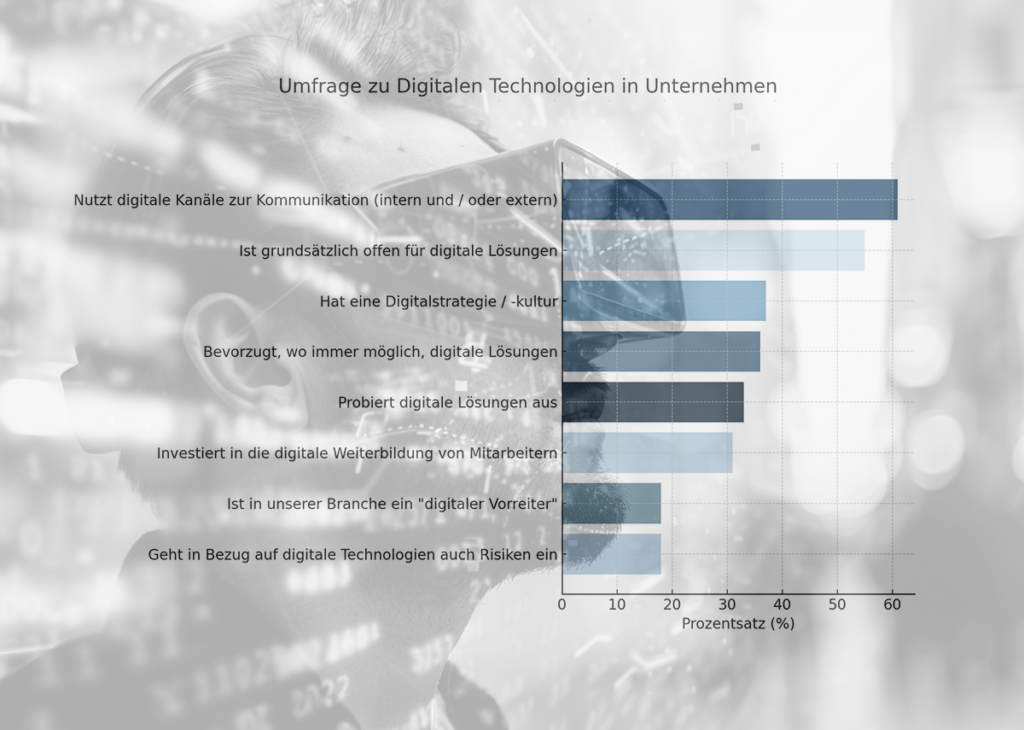Extended Reality: Versatile cross-sectional technology for small and medium-sized companies - the future technology with limitless potential
Language selection 📢
Published on: August 30, 2024 / update from: August 30, 2024 - Author: Konrad Wolfenstein

Cross-sectional technology Extended Reality – Innovative and future-oriented: Extended Reality for small and medium-sized companies – Image: Xpert.Digital
🚀 Extended Reality (XR): The future technology for the sustainable transformation of the German economy
🌟 Extended Reality (XR) is much more than just an emerging technology; it represents revolutionary progress that has the potential to sustainably transform the German economy. The immense importance of this high-tech development extends across numerous industries and offers opportunities that go far beyond what is currently imaginable.
A versatile cross-sectional technology 🌍
Extended Reality covers the entire range of Virtual Reality (VR), Augmented Reality (AR) and Mixed Reality (MR). These technologies allow digital and real worlds to be seamlessly connected, creating completely new possibilities for interaction and visualization. In industry, construction, medicine and even national security, XR is no longer a future scenario but is already a reality.
For example, in industry, XR enables the simulation of complex machine processes through digital twins. These digital images of real objects and systems allow engineers to test prototypes and optimize production processes before a physical model even exists. This not only reduces costs, but also minimizes the risk of errors and delays.
In the construction industry, XR is revolutionizing the planning phase of construction projects. Architects and builders can visually experience different planning variants through virtual tours, which makes decision-making much easier. Errors and changes can be identified and corrected at an early stage, increasing the efficiency of the entire construction process.
The versatility of XR is particularly impressive in medicine. Through three-dimensional, anatomical representations, doctors can better inform their patients about upcoming procedures. XR also supports complicated, invasive surgeries by allowing surgeons to precisely plan their movements and anticipate potential complications.
XR is also playing an increasingly important role in the area of national security. Virtual training simulates real threat scenarios in which emergency services can train their reactions without exposing themselves to real dangers. These realistic exercises are crucial to being prepared for unpredictable events.
Raise potential in small and medium-sized enterprises (SMEs) 💼
Although XR has already been successfully integrated into many large companies, a study by the vbw (Association of the Bavarian Economy) that small and medium-sized companies (SMEs) in particular still largely underestimate the possibilities of this technology. The actual application in this sector has so far lagged behind the potential. SMEs in particular could benefit significantly from XR, be it in production optimization, employee training or customer service.
In order to take advantage of these opportunities, knowledge and technology transfer must be further promoted. It is essential that not only large companies have access to these technologies, but also SMEs. These companies need to be supported in identifying and implementing the potential uses of XR for their specific needs.
A concrete step in this direction could be the increased provision of training and continuing education offerings that are specifically tailored to SMEs. These measures would not only improve the understanding of XR technologies, but also promote their acceptance and application in practice.
Challenges and future prospects 🔍
Despite all the opportunities that XR offers, there are also challenges that cannot be ignored. These include, in particular, the high acquisition costs for the required hardware as well as the complex integration of XR solutions into existing IT infrastructures. In addition, developing and customizing XR applications requires specialized know-how, which is still lacking in many companies.
Another aspect is security. Since XR applications often operate over the Internet, they need to be protected from cyberattacks. The risk that sensitive data falls into the wrong hands or that applications are manipulated is real and should not be underestimated.
Still, the benefits of XR far outweigh the challenges. In the future, technology will continue to develop and associated costs are expected to decrease. In addition, more and more user-friendly XR platforms are emerging that enable even smaller companies to benefit from the advantages of augmented reality without having to make extensive investments.
The role of politics and economics 🤝
In order to further promote the spread of XR technologies in Germany, politics and business are also in demand. It is important to create the right framework conditions, promote research and development in this area and facilitate access to funding. In particular, the focus should be on supporting start-ups and SMEs that can contribute to the further development of technology through innovative approaches.
Cooperations between companies and research institutions should also be intensified. Through joint projects and the exchange of know-how, the development of new XR applications can be accelerated and their market maturity can be reached more quickly.
Extended Reality as a driver of digital transformation 🚀
In an increasingly digitalized world, extended reality will play a key role. It has the potential to revolutionize entire industries and create new business models. By integrating XR into everyday work processes, companies can not only increase their efficiency, but also develop innovative products and services that give them a competitive advantage.
In addition, XR will play an important role in workforce training and skills development. Virtual training makes it possible to convey complex issues clearly and interactively. This is particularly advantageous in industries where practical experience and quick reactions are required.
A central building block of digital transformation 📈
Extended Reality is much more than a technological trend. It is a central component of digital transformation and offers enormous potential for the German economy. However, in order to fully exploit this potential, the existing hurdles must be overcome and the technology made accessible to everyone - especially SMEs, which form the backbone of the German economy.
The future of extended reality is bright. With the right support and willingness to invest in new technologies, Germany can take a leading role in this dynamic and future-oriented sector. It is now up to companies, politicians and society to seize the opportunities and set the course for a successful digital future.
📣 Similar topics
- 🌐 The future of the German economy: Extended Reality
- 🏭 XR Revolution: Innovations in Industry and Construction
- 🏥 Medical miracles: Extended Reality in the healthcare sector
- 🏢 XR: A must for small and medium-sized businesses
- 🔧 Digital twins: production processes redefined
- 🚧 Construction planning 2.0: Virtual tours and efficiency
- 🛡️ National Security: Virtual training for real challenges
- 📊 Challenges and opportunities of XR for SMEs
- 🎓 Further training 4.0: Interactive and practical training
- 🚀 Extended Reality: The driver of digital transformation
#️⃣ Hashtags: #AdvancedReality #GermanEconomy #Innovation #Digitalization #SME
🗒️ Xpert.Digital: A pioneer in the field of extended and augmented reality
🌟🌐 Survey on digital technologies in companies
🌐📊 The numbers shown in the graphic illustrate the different degrees of digitalization in companies and the willingness to integrate digital technologies. These numbers provide important insight into the current situation and the challenges that companies have to face during digital transformation.
✉️ Digital channels for communication (61%)
At 61%, the use of digital channels for communication (internal and/or external) is the most widespread aspect of digitalization in companies. This shows that most companies have already firmly integrated digital means of communication such as email, instant messaging, video conferencing and collaboration tools such as Slack or Microsoft Teams into their workflows. Leveraging these technologies allows companies to communicate more efficiently, especially in a globalized world where teams are often spread across different locations. Digital communication also contributes to making the world of work more flexible by supporting remote work and hybrid working models.
💡 Openness to digital solutions (55%)
At 55%, it shows that over half of the companies are fundamentally open to digital solutions. This number signals a positive attitude towards digitalization, which is an important step for companies that want to remain competitive in the digital era. Openness to digital solutions is a prerequisite for the successful introduction of new technologies, as it promotes a culture of innovation and supports the willingness to explore new paths. However, this openness does not automatically mean that the technologies are used effectively; it also requires a clear strategy and the necessary resources to successfully implement digital solutions.
🚀 Digital strategy and culture (37%)
Only 37% of companies say they have a digital strategy and culture. This is a crucial point as a well-defined digital strategy is necessary to set the direction and priorities for digital initiatives. A digital culture, on the other hand, promotes the acceptance and use of new technologies throughout the company. The comparatively low number shows that many companies are still at the beginning of their digital transformation and that there is still considerable potential to develop a comprehensive digital strategy that covers all aspects of the company.
🎯 Preference for digital solutions (36%)
At 36%, only about a third of companies prefer digital solutions whenever possible. This number indicates that many companies are still stuck in traditional ways of working and are not consistently considering digital solutions as a preferred option. It also shows that companies may still be hesitant to switch fully to digital processes, whether due to fear of risks, lack of trust in the technologies or lack of resources. However, the preference for digital solutions is an indicator of a future-oriented corporate culture that is aware of the efficiency and flexibility of digital technologies.
🧪 Experimenting with digital solutions (33%)
33% of companies are trying digital solutions. This number suggests that a third of companies are willing to test and experiment with new technologies before considering full implementation. This willingness to experiment is important for discovering innovative solutions and assessing their suitability for the company. However, the number also shows that a large proportion of companies are still hesitant to carry out such experiments, which indicates a certain uncertainty or reluctance towards digital innovations.
📚 Investments in digital training for employees (31%)
Only 31% of companies invest in digital training for their employees. This low number shows that many companies may not yet have recognized the need to prepare their employees for the challenges of digital transformation. However, further training is a central factor for the success of digitalization, as new technologies often require specialized knowledge. Companies that invest in the skills of their employees are better equipped to use digital technologies effectively and remain competitive in the long term.
🔝 Digital pioneers in the industry (18%)
At only 18%, relatively few companies see themselves as digital pioneers in their industry. This number shows that the majority of companies tend to be latecomers when it comes to introducing and using digital technologies. Digital pioneers often set standards and drive innovations that can benefit the entire industry. However, the low proportion of pioneers shows that there is still a lot of catching up to do in many industries when it comes to integrating and using digital technologies to stand out from the competition.
⚠️ Dealing with risks of digital technologies (18%)
Likewise, only 18% of companies state that they consciously take risks when dealing with digital technologies. This is a critical point because innovation and the use of new technologies always involve a certain degree of uncertainty and risk. Companies willing to take these risks can gain significant competitive advantages by implementing new technologies early and exploiting their potential. However, the small number shows that many companies tend to avoid risks and may miss opportunities to advance digital transformation.
Suitable for:
📈 Development of a digital strategy
The numbers from the graphic make it clear that many companies are still in their infancy when it comes to digital transformation. While the use of digital communication channels is widespread, there is still a lot of catching up to do in other areas such as developing a digital strategy, training employees and the willingness to take risks.
Companies that position themselves as digital pioneers and invest in a comprehensive digital strategy have the chance to strengthen their market position and be successful in the long term. The numbers underline the need not only to be open to digital solutions, but also to proactively invest in implementation and cultural transformation to realize the full potential of digitalization.
📣 Similar topics
- 📊 Degree of digitalization in companies
- 📣 Digital Communication: The leading aspect of business transformation
- 🚀 Pioneers of digital transformation: Who is leading the industry?
- 💡 Openness to innovation: Digital solutions in companies
- 📈 Strategies and cultural change: Why a digital strategy is crucial
- 🔍 Challenges of the digital era: risks and opportunities
- 💼 Preference for digital technologies: A third of companies
- 📘 Further training in the digital age: investing in employees
- ⚡ Willingness to experiment in companies: test digital solutions
- 🌐 The future of digital communication and collaboration
#️⃣ Hashtags: #Digitalization #CorporateTransformation #DigitalStrategy #DigitalCommunication #Innovation
Our recommendation: 🌍 Limitless reach 🔗 Networked 🌐 Multilingual 💪 Strong sales: 💡 Authentic with strategy 🚀 Innovation meets 🧠 Intuition
At a time when a company's digital presence determines its success, the challenge is how to make this presence authentic, individual and far-reaching. Xpert.Digital offers an innovative solution that positions itself as an intersection between an industry hub, a blog and a brand ambassador. It combines the advantages of communication and sales channels in a single platform and enables publication in 18 different languages. The cooperation with partner portals and the possibility of publishing articles on Google News and a press distribution list with around 8,000 journalists and readers maximize the reach and visibility of the content. This represents an essential factor in external sales & marketing (SMarketing).
More about it here:
💼🚀 The importance of digital transformation
🌐 Digital transformation is more than just a buzzword today; it is a necessity for companies that want to survive in an increasingly competitive market. It's not just about implementing new technologies, but also about changing company culture to use these technologies effectively. Companies that use digital channels for communication and other business processes are often more flexible, responsive and better able to respond to market changes. Openness to digital solutions is therefore a key characteristic of successful companies in the digital era.
🛠️🔧💡 Challenges in implementing digital technologies
Despite the obvious benefits that digital technologies offer, many companies face significant challenges in implementing them. One of the biggest hurdles is developing a clear digital strategy that takes into account not only the technical but also the cultural aspects. Without such a strategy, companies run the risk of only superficially integrating digital solutions without exploiting their full potential.
Another critical point is the willingness to take risks. The introduction of digital technologies, especially innovative approaches such as extended reality, often requires significant investments and a high degree of uncertainty. Companies must be prepared to take these risks while ensuring they have the necessary expertise to use these technologies effectively.
Suitable for:
🌟🔍👓 The role of extended reality in companies
Extended Reality (XR) offers numerous opportunities to optimize business processes, improve employee training and revolutionize customer interactions. In the manufacturing industry, for example, AR glasses can be used to support maintenance work or display work instructions directly in workers' field of vision. In the real estate industry, VR allows potential buyers to view properties without having to be physically present. These technologies can not only increase efficiency, but also create new business models.
However, many companies are struggling to fully integrate XR technologies. They often lack the necessary skills or willingness to invest in the necessary infrastructure. This is compounded by the fact that XR technologies are still relatively new and therefore lack proven best practices.
📚🎓🔧 The importance of continuing education for employees
Another important aspect of digital transformation is employee training. Technologies such as XR require specialized knowledge, and companies must ensure that their employees develop the necessary skills to use these technologies effectively. This can be done through training, workshops or by working with specialist providers. Companies that invest in employee training are better equipped to take advantage of new technologies and differentiate themselves from the competition.
🌟⚙️🏆 Digital pioneers in the industry
Some companies have already established themselves as digital pioneers and are showing what the successful integration of digital technologies can look like. These companies are using not only XR but also other advanced technologies such as artificial intelligence (AI), big data and the Internet of Things (IoT) to optimize their processes and open up new business opportunities. They are often pioneers in their industry and set standards that other companies follow.
⚠️🔍🔒 Risks and challenges when using digital technologies
Although the benefits of digital transformation are undeniable, there are also risks that cannot be ignored. This includes not only the financial risks already mentioned, but also security concerns. The increasing interconnectivity of devices and systems increases the risk of cyberattacks, and companies must ensure they have robust security measures in place to protect their data.
Furthermore, there is a risk that companies that rely too heavily on digital technologies will lose their flexibility. In a rapidly changing technological landscape, this can result in companies struggling to adapt to new developments.
🔮🚀🛠️ The future of digital transformation
Digital transformation will continue to play a central role in corporate strategy in the future. Companies that want to be successful must not only be prepared to invest in new technologies, but also adapt their corporate culture accordingly. This requires an open attitude towards innovation, a clear digital strategy and the willingness to invest in the further training of your employees.
Extended reality is just one of many technologies that have the potential to fundamentally change the way businesses work. While the challenges are great, the opportunities presented by these technologies are even greater. Companies that embrace these technologies early and are willing to take the necessary risks will be able to secure a competitive advantage and strengthen their position in the market.
📝🔧💡 Integration of digital technologies
The integration of digital technologies, especially extended reality, represents a significant opportunity for companies to optimize their processes, open up new business areas and strengthen their competitiveness. At the same time, they must face the associated challenges and develop a holistic digital strategy that takes both technological and cultural aspects into account. Companies that overcome these challenges will be able to consolidate their position in the digital economy and benefit from the enormous potential that these technologies offer.
The key to success lies in the combination of openness to digital solutions, a clear strategy, the willingness to take risks and continuous training of employees. This is the only way companies can ensure that they not only keep up with technological developments, but also actively shape the future.
📣 Similar topics
- 📣 The importance of digital transformation for companies
- 📊 Challenges in implementing digital technologies
- 🚀 Extended Reality: Opportunities and Challenges
- 👩🏫 Employee training in the digital era
- 🏆 Digital pioneers: successful examples from practice
- 🔒 Security risks when using new technologies
- 🔍 Clarity and strategy in digital transformation
- 🤖 Artificial intelligence and big data: key technologies of the future
- ⚙️ The role of IoT in corporate digitalization
- 🔮 The future of digital transformation: trends and forecasts
#️⃣ Hashtags: #DigitalTransformation #ExtendedReality #ArtificialIntelligence #EmployeeFurtherTraining #SecurityRisks
We are there for you - advice - planning - implementation - project management
Xpert.Digital - Pioneer Business Development
Smart Glasses & KI - XR/AR/VR/MR industry expert
Consumer metaverse or meta -verse in general
If you have any questions, further information and advice, please feel free to contact me at any time.
I would be happy to serve as your personal advisor.
You can contact me by filling out the contact form below or simply call me on +49 89 89 674 804 (Munich) .
I'm looking forward to our joint project.
Xpert.Digital - Konrad Wolfenstein
Xpert.Digital is a hub for industry with a focus on digitalization, mechanical engineering, logistics/intralogistics and photovoltaics.
With our 360° business development solution, we support well-known companies from new business to after sales.
Market intelligence, smarketing, marketing automation, content development, PR, mail campaigns, personalized social media and lead nurturing are part of our digital tools.
You can find out more at: www.xpert.digital - www.xpert.solar - www.xpert.plus


























